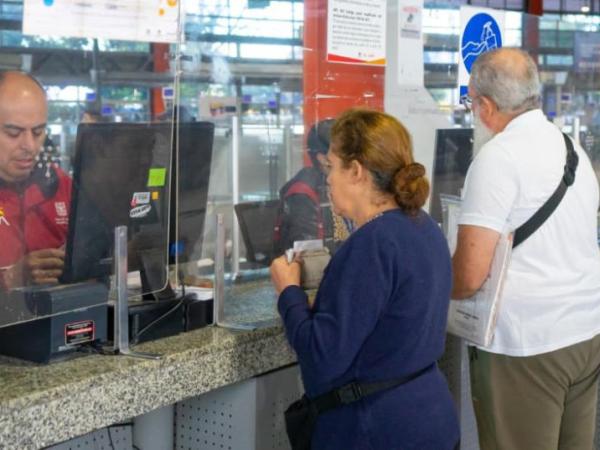Although optimism is one of the most notable characteristics of Colombians and recent studies have highlighted it as a quality that few have, the recent economic storms keep certain fears alive among people, regarding the country’s fiscal future and how that could impact your personal finances.
This was demonstrated in a recent Ipsos report, titled “Global Predictions for 2025”, which warns that taxes, the cost of living, unemployment, the power of your income and monetary policy decisions are of concern. to more than half of the population, who in turn maintain low optimism for the future.
Also read: ‘Today’s applause is tomorrow’s tears’: Union Council
As explained by the researchers in charge, after conducting a survey in 33 countries, it was determined at a general level that 79% of the participants believe that prices will grow faster than their income, maintaining a constant concern that has not changed since 2022. At the same time, 74% anticipate higher taxes and 68% fear an increase in unemployment, evidencing a lack of confidence in a substantial economic recovery.
“In a survey conducted in 33 countries, 79% of participants believe that prices will grow faster than their income, maintaining a constant concern that has not changed since 2022. At the same time, 74% anticipate higher taxes and 68% fear an increase in unemployment, evidencing the lack of confidence in a recovery substantial economic”, they indicated.
Taxes
iStock
That said, Ipsos highlighted that the results reflect a mix of factors, starting with persistent inflation, delays in post-pandemic monetary policies and geopolitical tensions that have limited economic growth, which continue to undermine citizen confidence.
Colombia Case
The figures in the global context are not the best and when zooming in on the local panorama, the reality is not far away in each case, since the same concerns that shake the world take their toll on the perception of Colombians and darken hope for what may happen in 2025.
More information: Alert for a ‘shu, shu, shu’ in the electrical sector by administrative means
In this sense, Ipsos maintained that in Colombia, the economic panorama reflects the tensions that are also experienced in the rest of the world, although with particular nuances, since, for example, a resounding 77% of Colombians consider that prices will increase more faster than its revenue in 2025, aligning with the global average.
However, pessimism grows even more in relation to taxes, aspect in which 79% of those consulted believe that they will be higher this year, leaving a percentage that exceeds the international average.

What was the November inflation in Colombia?
iStock
“On the other hand, although unemployment continues to be a concern for 69% of Colombians, this figure represents a reduction of five percentage points compared to the previous year, which could be interpreted as a slight advance in job creation,” he says. the report.
Another element consulted was the expectation regarding the future of monetary policy and it was observed that interest rates continue to be a thorn in the side, given that 70% of Colombians expect them to rise in 2025. a figure that, although lower than in 2024, is still above the global average.
“Compared to other Latin American countries, Colombia presents an intermediate scenario. Peru (72%) and Mexico (75%) lead the expectations of increasing interest rates in the region, while, in terms of inflation, Colombia remains at 72%, below the global 79%, but still with serious concerns,” they explained.
To understand this situation, analysts pointed out that years of tax adjustments and volatility in the prices of basic goods have exacerbated the perception of uncertainty on this front, so we will have to wait for tempers to calm down later, as long as the necessary measures are taken.
Other news: Tigo and Movistar must provide more information to be able to begin the integration process
“However, the decline in expectations of interest rate increases could be a light at the end of the tunnel. Although these measures are necessary to control inflation, they also limit access to credit and slow down consumption. A stabilization in this aspect could give way to a more favorable 2026,” they stated.
Having said all of the above, Ipsos closed by saying that this year begins with a global economy that continues to face important challenges, but also shows some signs of change, which depending on how things progress.will have various impacts on the peace of mind and confidence of consumers.
“For Colombia, the challenge will be to balance the tax burden, encourage investment and generate employment, so that the optimistic figures can finally be translated into a better quality of life for its citizens,” they concluded.

Debt
PHOTO: iStock
Complex panorama
At this point it is worth remembering that 2024 was a year that It was characterized by strong fiscal tension that originated from the overestimated collection projections that the National Government initially made and that were not met, forcing spending cuts to be made during that period.
On the other hand, the constant pronouncements and attempts that have been made by the Casa de Nariño and the Ministry of Finance regarding a possible tax reform, which was even attempted to be passed at the end of the year as a financing law, have also generated an impact on people’s perception.
Now, taking as a reference the data presented by Ipsos in this survey, one of the priorities of the authorities this year should be the recovery of the confidence of investors and citizens in general, since these two elements are fundamental to encourage consumption and investment, two lines of the economy that They are already showing improvement, but they are still at low levels.
















